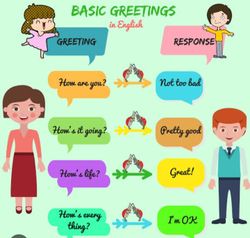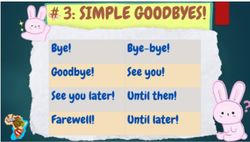Aug 22, 2023
Greetings and Responses

Let’s learn about greetings and introductions so we can say hello and goodbye. We will also learn how to introduce yourself and other people.
Introductions
My name is ______. (introducing yourself)
This is ______. (introducing someone else)
Polite Questions
How are you?
How are you doing?
How have you been?
How’s your day going so far?
How’s it going?
How are things?
Note that the person speaking with you will probably ask you one or more of those questions. This means that you should also know how to answer them. Here are a few possible answers:
Polite Answers
I’m great or I’m fine
I’m doing well
I’ve been doing very well
My day has been pretty good so far
Not too bad
Things are really good
You can also add “thanks for asking” at the end of any of these phrases to make them a little friendlier!
How to Start a Conversation in English
Whether you’re speaking with someone face-to-face, through Skype, or over the phone, greetings are an essential part of getting your English conversation started.
You will only need to learn a few common greetings, but the words you use will vary based on the situation. For example, in a job interview, you should use a formal greeting, but when you meet a friend for coffee, you’ll likely say something informal.
Here are a few examples of both:
Formal Greetings
Hello
Good morning
Good afternoon
Good evening
It’s nice to meet you
It’s a pleasure to meet you
Informal Greetings
Hi
Hey
What’s up
Nice to meet you
Pleased to meet you
It’s a pleasure
How to Make Small Talk in English
“Small talk” is just a polite exchange used to pass the time, share non-essential information, or learn more about the other person. It’s also a great form of English conversation practice.
This kind of communication can span a wide range of topics, from weather to sleep habits. Small talk often begins naturally with questions like, “How are you?” From there, it can expand to cover greater detail and more topics.
Examples of Small talk conversations:
Conversation about: Movies
Person 1: What kinds of movies do you like?
Person 2: I love comedy movies!
Person 1: Oh, I love horror movies, too! But I can’t watch them alone.
Person 2: Me neither!
Person 1: What other kinds of movies do you like?

When you want to say goodbye, you can use the expressions above or below.
Examples:
Bye Jane! See you later!
Goodbye class! See you tomorrow!
It’s time to go. Goodbye!
Bye-bye! I’ll see you tomorrow at 10.
I have to go now. See you this evening!
Bye John! Until later!
Goodbye everyone! See you next time.
Farewell for now. I hope we meet each other again soon.
See you on Saturday! Take care until then!
Goodbye my friend. You’re the best. I can’t wait to see you again.
By undefined
8 notes ・ 7 views
English
Beginner